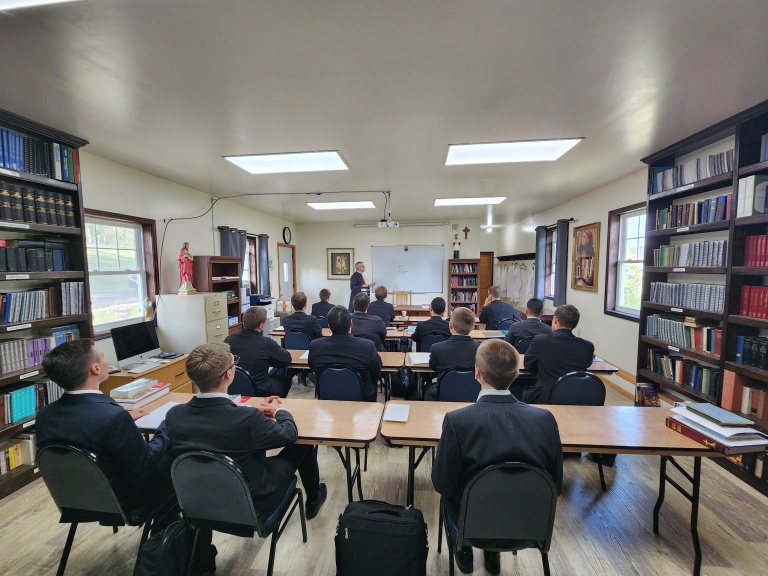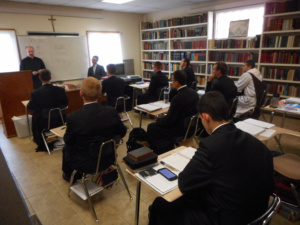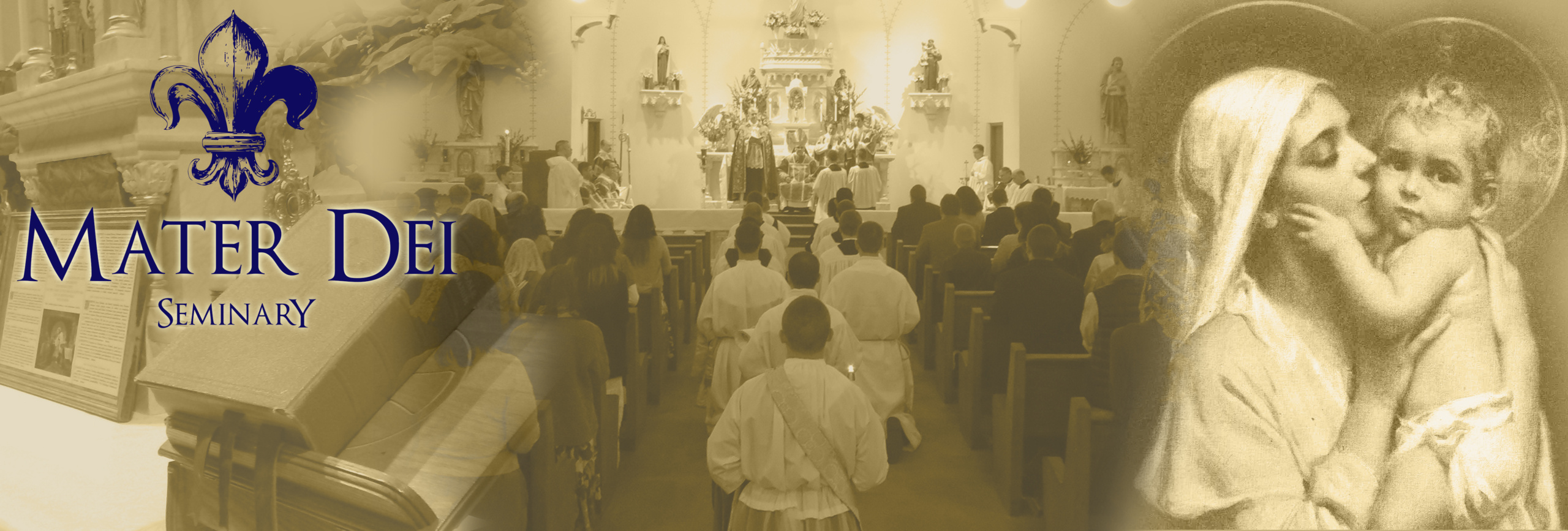Course of Studies
The seminary offers a full-time six year course of studies in preparation for the reception of Holy Orders in the traditional rite. The six-year theological studies program comprises of these classes:
• Philosophy is taught during the first two years of the seminary. The following are the different branches of philosophy:
Logic – correct thinking
Criteriology – certitude of our thoughts
Cosmology – the material world
Theodicy – God, His Nature, Attributes, and Activities
Ontology – being
Ethics – morality of human conduct based on reason
Sociology – man in society
Psychology – living bodies and the human soul
• Dogmatic Theology – the study of Divine Revelation
• Moral Theology – study of the morality based on Divine Revelation
• Sacramental Theology – study of the administration of the Sacraments and the Holy Sacrifice of the Mass
• Sacred Scripture – study of the Old and New Testaments
• Canon Law – study of the legislation of the Church
• Latin and Greek – *
• Ecclesiastical History – study of the history of the Catholic Church
• Ascetical Theology – study of the spiritual life
• Liturgy – study of the rubrics
• Ecclesiastical Chant – study of Gregorian chant
• Homiletics – study of the art of preaching
• Patrology – study of the teachings of the early Fathers of the Church
* Latin and Greek are the two ecclesiastical languages studied. At the end of an entire six year seminary course, a seminarian will have four years of Latin and two semesters of Greek.
Course Description for Mater Dei Seminary
Introductory Dogmatic Theology I
This course covers Divine Revelation, Faith. The attributes of God, the existence of God, creation, and the creatures of God: man and angels.
Textbook: God and Creation. Herzog
God the Redeemer. Herzog
Channels of Redemption. Herzog
Philosophy:
A) Dialectics (Logic)
The study of correct thinking. This course covers, the idea (description and definition), it expressed and explained. It covers the judgment itself and when expressed in its propositions. It also covers the reasoning and its expression in syllogisms, its laws, figures, and moods.
Textbook: Logic. Glenn
B) Criteriology
The most fundamental of philosophical sciences, the certitude of cognition. This course investigates knowledge in general, sense knowledge, and intellectual knowledge. It covers the nature of truth, the different states of mind and the criterions of truth. It also covers the nature of certitude and its existence.
Textbook: Criteriology. Glen
C) Ontology
The science of being. This course covers the idea of being, and the primary determinations of being (real being, logical being, actuality, potentiality, essence and existence) The properties of being (oneness, trueness goodness, beauty and perfection). The classification of being: categories, substance and accidents, causes- intrinsic and extrinsic.
Textbook: Ontology. Glenn
D) Cosmology
Philosophical study of created things. This course covers the character of bodies, and their constitution: (Monism, Atomism, Dynamism and Hylomorphism) It covers the Creation and development of the world, the final casuality and ultimate end of creation, as well as nature with her laws and miracles.
Textbook: Cosmology. Glenn
Latin I
This course covers basic vocabulary, the five declensions of nouns and their use.
It also covers the four conjugations of verbs, the use of verbs, present, past, future tenses, indicative and subjective moods, active and passive voices
Textbook: First Year Latin. Henley
Sacred Scripture I
Introduction to the Bible. This course covers biblical inspiration: a) existence b) nature c) extent and d) effects. The Biblical Canon, the history of the Old Testament, the New and the Apocryphal books. The texts and versions of the Bible. The interpretations of Holy Scripture (Noematics – various senses, Heruistics – discovery of the sense. Prophoristics- the explanation of the text) History of Exegeses, Sacred Antiquities, Archaeology and Geography of the Holy Land
Textbook: The Great Commentary. Cornelius A Lapide
Ascetical Theology I
The spiritual life. This course covers man’s relation to God, the perfection of the Christian life, and the duty of tending to perfection and its general means. The purgative way, the illuminative way and the unitive way.
Textbook: The Spiritual Life. Tanquerey
Ecclesiastical History I
This course covers the Apostolic Age (AD – 1500), expanding Christianity, its political background, its persecutions, establishments, doctrine and councils, heresies of the ages, art and its development, worship, writers, saints and missions.
Textbook: Church History. Laux
Ecclesiastical Chant I
This course covers the characteristics that distinguish Sacred Chant, and the rules that have guarded the ancient melodies. It learns the principle forms of the notations, and the rules for interpretations. It teaches the modes, the choice of pitch as well as the reading and pronunciation of liturgical Latin.
Textbook: Gregorian Chant: A Textbook for Seminaries, Novitiates and Secondary Schools. Rev. Andrew Klarmann
Dogmatic Theology I
Apologetics /Defense of the Faith against Atheists, Agnostics, Pantheists, Polytheists, etc. Shows that the Catholic Religion may be investigated by the unaided mind of man, is reasonable, right and true, that the arguments used against the claims of the Catholic Religion are unwarranted, unreasonable and fallacious. Study of the religions of the world
Textbook: The Defense of the Catholic Church. Doyle
Philosophy:
Ethics
Philosophical study of morality and natural laws. This course covers human acts, its ends, the law and conscience. The morality of human acts, its properties and consequences. Individual Ethics studying man’s duties toward God, himself, and his neighbor. Social Ethics toward the family, the state, work, church and the world family of nations.
Textbook: Ethics. Glenn
Sociology
The Philosophy of human society. This course studies the fundamental principles of God and the soul of man. It covers the structure of society, the family, a natural imitation of God and its social functions, proper order and harmony of society.
Textbook: Sociology. Glenn
Psychology
The science of life and its manifestations This course covers life (vegetal, sentient and origin of species), it covers human life, sentiency (nature and kind, sensation, appetition and locomotion), intellect, and will (nature, interaction of the intellect and will, free will ).
Textbook: Psychology. Glenn
Theodicy
Philosophical study of God. This course studies God’s existence, The nature of God in His Essence and Attributes as well as the operations of God shown in the immanent and the transient.
Textbook: Theodicy. Glenn
Latin II
This course follows an intensive review of forms and elementary syntax as well as making translations of Caeser’s Gallic Wars.
Textbook: Second Year Latin. Henley
Sacred Scripture II
Study of the Old and New Testaments, the doctrinal, moral and prophetical aspects of Sacred Scripture.
Textbook: A Practical Commentary on Holy Scripture. Bp. Frederick Knecht
Greatest Stories Ever Told. Charles Callan, OP
Biblical Questions Series. Rudolph Bandas
Ascetical Theology II
This course covers the study of the practice of Christian Virtues. Christ, the source of our supernatural life, our incorporation into Christ, devotion to Mary, the sharing in the priesthood and sacrifice.
Textbook: Doctrine and Devotion. Tanquerey
Ecclesiastical History II
This course covers the history of the Church from 1500 to the present time. Protestant Reformation, secularization of Europe, the Enlightenment, Democracy, etc. the political background, its opposition, doctrines and councils, heresies of the times, art and its development, liturgical worship and its development, writers, communities established, saints and missions begun.
Textbook: Church History. Laux
How the Church Built Western Civilization-Woods
Moral Theology I
This course defines Moral Theology, studies the nature of human acts, and its determinants. It covers the law- its promulgations, obligations, interpretations, dispensations, Epeikeia and customs. It covers sin – conditions, species, capital and contrary virtues. It covers virtues- infused and acquired.
Textbook: Moral and Pastoral Theology, Vol.I. Henry Davis
Outlines of Moral Theology. Francis J. Connell
Dogmatic Theology II
This course studies God, His Knowability, Essence and Attributes The Holy Trinity in unity or the threefold personality of God, the study of Creation as a Divine act, Dogmatic Cosmology and Anthropology and Christian Angelology. The Constitutive elements of Christ, The Hypostatic Union and its effects. The work of Redemption and the three offices of the Redeemer. The Divine Maternity, Mary’s special prerogatives and the invocation of the saints.
Textbooks: 1) God His Knowability, Essence, and Attributes 2) The Divine Trinity 3) God the Author of Nature and the Supernatural 4) Christology: A Dogmatic Treatise on the Incarnation 5) Soteriology: A Dogmatic Treatise on the Redemption 6) Mariology: A Dogmatic Treatise on the Blessed Virgin Mary. Joseph Pohle
Canon Law I
This course covers the Law in General and particular. The sources of Canon law, the history, the councils, the Greek and Ancient Latin collections, Commentaries on the Code for Ecclesiastical Laws, on customs, reckoning of time, rescripts, privileges and Dispensations.
Textbook: Canon Law. Cicognani,
Canon Law A Text and Commentary. Bouscaren
Patrology I
This course studies the rules and principles which help determine the authority of the Fathers and their authenticity, right, use and application of their works in theology. The great Apostolic Fathers, the Greek Fathers- Apologists, Controversialists and commentators as well as the Latin Fathers and Writers. It looks at the full growth and then the decline of Patristic Literature.
Textbook: A Manual of Patrology. Bernard Schmid
Latin III
This course looks at the history of Roman Oratory and the four great periods in the development of the Roman language and oratory: (Roman period, Greek period, Ciceronian period, and Imperial period) It studies the types and outlines of an oration, translating them from Latin to English or vice versa.
Textbook: Third Year Latin. Robert Henley
Sacred Liturgy I
Studies chief sources of our knowledge of Liturgical Laws, the decrees of the Sacred Congregation of Rites, the technical expressions, the customs and writings of the rubricists.
Textbook: Catholic Liturgics. Baier
Ecclesiastical Chant II
Study of the Official Musical Text. The Solesmes Method, Principle Masses and chants.
Moral Theology II
This course covers the ten commandments its precepts and particulars, as well as the precepts of the Church.
Textbook: Moral and Pastoral Theology, Vol. II. Davis
Moral Theology. Jone-Adelman
Dogmatic Theology III
This course covers actual grace, sanctifying grace, the sacraments in general, Baptism, Confirmation, The Holy Eucharist, Penance, Extreme Unction, Holy Orders, and Matrimony, showing history, proofs and speculations. Also Eschatology – the study of the last things.
Textbooks: 1 )Grace: Actual and Habitual 2) The Sacraments Vol. I 3) The Sacraments Vol. II 4) The Sacraments Vol. III 5) The Sacraments Vol. IV 6) Eschatology: The Catholic Doctrine of the Last Things. Joseph Pohle
Canon Law II
This course studies the general norms of Canon Law, extending to persons, things, procedures, crimes and penalties.
Textbook: Canon Law A Text and Commentary. Bouscaren
Latin IV
This course studies the Latin grammar, vocabularies, and exercises in preparation for the reading of the missal and breviary. Also studies irregular declensions, cardinal and ordinal numerals, the four regular conjugations complete and the conjugations of the common irregular verbs. Passive voice, adverbs, gerunds, conjunctions, infinitive, subjunctive, prepositions, impersonal verbs, and clauses.
Textbook: Latin Grammar for the Reading of the Missal and Breviary. Scanlan
Second Latin for the Reading of Philosophy, Theology and Canon Law
Moral Theology III
This course studies the Sacraments: Baptism, Confirmation, Holy Eucharist, Penance, Indulgences, and censures in generals and particulars of obligations and principles.
Textbook: Moral and Pastoral Theology. Davis Vol. III
Dogmatic Theology (Ecclesiology) IV
This course studies the scientific Analysis of Religion considered abstractly, the truth of the Christian-Catholic Religion, the Church viewed from the outside (Apologetics), the Church viewed from the inside (dogma), The sources of Revelation, the objects and acts of Divine Faith
Textbook: The Church of Christ. Van Noort
Canon Law III
This course is a concise presentation of the current disciplinary norms of the Church. It covers not only theoretical expositions of legal principles but also its practical application.
Textbook: Canon Law A Text and Commentary. Bouscaren
The Sacred Canons- Abbo & Hannan
Sacramental Theology I
This course covers the proximate moral principles and canonical norms directing and guiding the sacramental ministry. A very practical help for the administration of the sacraments.
Textbook: The Administration of the Sacraments. Halligan, OP
Sacred Liturgy I
This course studies the General Rubrics of the Roman missal, the rite of Celebration of a Low Mass, the special forms of Low Mass, the serving of it and special cases. The rite of High Mass and sung Mass, some special forms and special cases at a High Mass.
Textbook: Celebration of the Mass. J. O’Connell
The Book of Ceremonies– Msgr. Lawerence O Connell & Rev. Walter Schmitz, STD
Greek
This course studies the Greek alphabet, the verbs, the three declensions, word order and revisions, its nouns, verbs, adjectives, prepositions, consecutive clauses, indirect statements and questions, and of course Greek vocabulary.
Textbook: Greek for Beginners. L.A. Wilding
Basic Greek. Jim Found
Moral Theology IV
This course covers in all its particulars: Extreme Unction, Holy Orders, Marriage, the Clerical state, the Religious state and the duties of certain classes of laypeople and the particular obligations for the proper fulfillment of each.
Textbook: Moral and Pastoral Theology. Davis Vol. IV
Medico- Moral Problems. Gerald Kelly
Towards Happiness and Holiness in Marriage
Pastoral Theology
This course studies the Sacraments in general and in particular and the pastoral administration of temporal matters, spiritual direction, and pastoral care of souls.
Textbook: A Manual of Pastoral Theology. Schulze
Homiletics
This course studies the manner of preparing and delivering sermons. It studies the acknowledged masterpieces of pulpit oratory of the seventeenth and eighteenth centuries.
Textbook: Manual of Homiletics and Catechetics– Ignaz Shuech, OSB
Our Preaching: Characteristics of the Sermon Types and the Church Law on and Ceremonial Preaching– John Sharp, STB
Fundamental Course in Sacred Eloquence. John Selner
Latin – Ecclesiastical Treatises IV
This course translates various treatises of the Fathers of the Church such as St. Robert Bellarmine and St. Thomas Aquinas.
Sacred Liturgy II
This course is a study of the rubrics pertaining to the administration of the Sacraments, Divine Worship, and the Divine Office.
Textbook: Matters Liturgical- The Collectio Rerum Liturgicarum. Joseph Wuest, CSSR
The Rubrics of the Roman Ritual. O’Kane
Holy Week Manual for Priests– Walter Schmitz
Simplification of the Rubrics– O’ Connell
